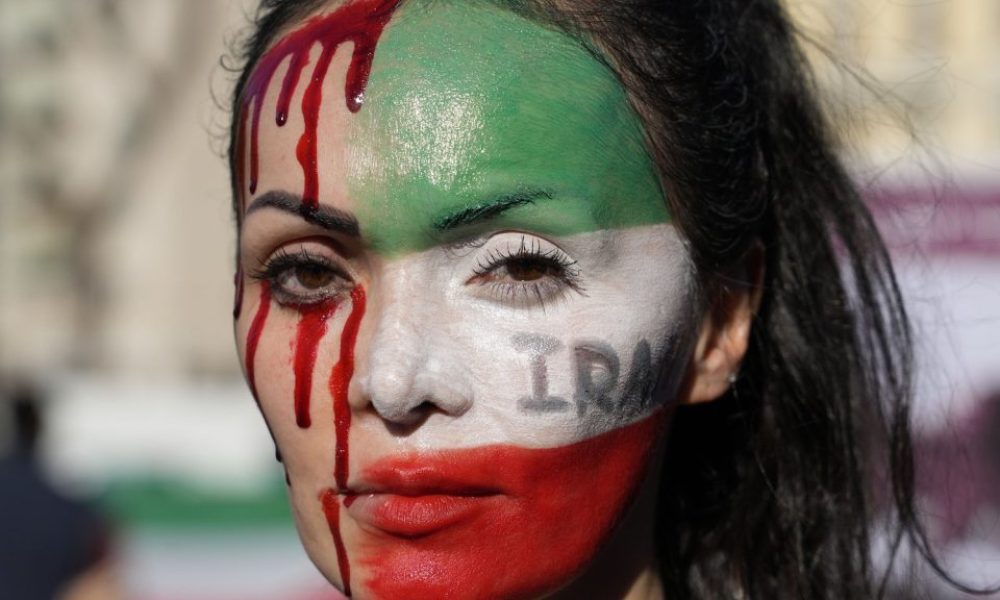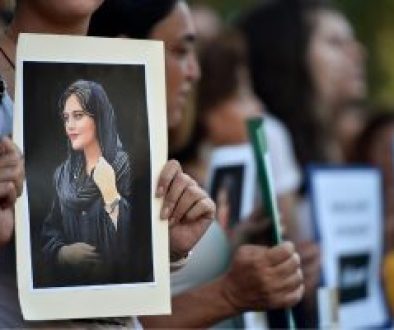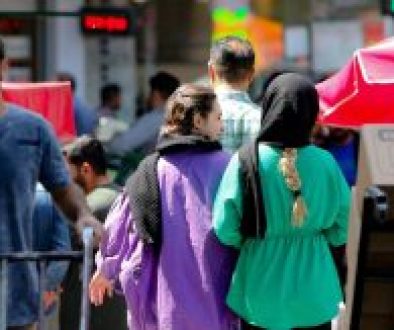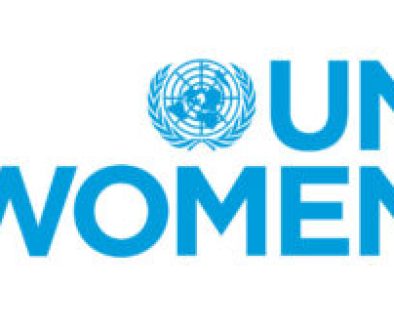11 Ways to Take Action for Iranian Women 1 Year After Mahsa Amini’s Death
LISTEN TO THIS ARTICLE
By Tess Lowery
August 29, 2023
Editor’s note: This article contains mentions of sexual violence.
No one could have predicted that the death of Mahsa Jina Amini, a 22-year-old Kurdish woman, would start the most significant uprising in Iran since the 1979 revolution.
It’s been over a year since Amini died in custody after being arrested by the so-called “morality” police in Tehran, Iran’s capital city, for showing her hair beneath her hijab on Sept. 16, 2022.
Since then, the women of Iran have defied the Islamic Republic’s oppressive regime by cutting their hair, burning their hijabs, and dancing in the streets. Their bravery captured the world’s imagination and all across the globe, people took to the streets in their hundreds of thousands to stand in solidarity with Iran’s protests.
In Paris, France, the Eiffel Tower illuminated the words “Femme. Vie. Liberté.” (Woman. Life. Freedom) — the international battle cry of the protest movement. In Sydney, Australia, people chanted: “say her name.” In Turkey, protestors gathered brandishing photographs of Iranian women killed in the country’s brutal crackdown on demonstrations.
For “brutal” is the right word to describe the Islamic Republic’s lethal retaliation. It’s a response that has been characterized by mass arrests, the public execution of demonstrators, beatings, sexual violence and electric shocks used on children, military assaults, and the killing of dozens of teenagers and children. As for the dress rules that Amini was arrested for in the first place, Iranian authorities are considering a draconian new bill on hijab-wearing that would include much longer prison terms for women who refuse to wear the veil, stiff new penalties for people who flout the rules, and the use of artificial intelligence to identify women in breach of the dress code.
At least 537 people have been killed by security forces as of April 4, 2023, but Iranian journalists have argued that data released by Iran’s National Organization for Civil Registrationsuggests the numbers could be much higher.
In the year since Mahsa Jina Amini was killed, things have gotten worse, not better, for women in Iran.
In fact, in August of this year, the Iranian authorities rounded up and detained 12 human rights activists, all but one of them women.
While women inside Iran are handed out leaflets calling for a day of action, people all over the world used “Mahsa Day” as a day to march, to remember, to remind the women of Iran that we stand with them, and to send a message to the Iranian authorities that cannot be ignored: we will not sit quietly, we do not accept this, and we do not give up.
As Naza Alakija, CEO of Evoca Foundation and senior adviser to UNICEF, said: “Stand with us! Thank you for hearing us. Thank you for supporting us. Please don’t stop! So many people have lost their children, their sisters, their wives. If we can now keep this public support around the world, then something will hopefully change for the better.”
Here are 13 things you can do to stand with the women of Iran wherever you are.
1. Organize or attend a march, vigil, or memorial.
While marches, rallies, and protests took place all over the world on Sept. 16, 2023 including in London, New York, Washington D.C., Bonn, Hamburg, Paris, Milan, Rome, Helsinki, Oslo, Istanbul, Geneva, and more, taking to the streets needn’t be confined to a single day.
If there isn’t a protest happening near you, why not start your own?
Diaspora for Iran, a platform that tells the visual story of the Iran Revolution, has put together posters and signs you can download and print or post on social media.
2. Hold a minute’s silence.
A minute’s silence is a very subtle but powerful form of activism. Sometimes, there simply are no words and only silence will do.
Ask your friends, family, or colleagues to join you in a minute’s silence. Or how about printing a flier explaining this is what you’ll be doing on the day and handing it out in your neighborhood?
3. Sign the open letter urging countries to recognize the crime of gender apartheid.
Women and girls who live under the regimes of the Islamic Republic of Iran and Taliban in Afghanistan live in an extreme structural system designed to oppress them.
Apartheid standards in international law, developed in the 20th century, were designed to address racial apartheid. Yet, according to End Gender Apartheid, this should include gender hierarchies, not just racial ones. The campaign is seeking to expand the set of moral, political, and legal tools available to mobilize international action against and ultimately end the regimes that are oppressing women because of their gender.
Sign the open letter by Iranian and Afghan women, international lawyers, and global women leaders urging countries to recognize the crime of gender apartheid.
4. Demand that the international community urgently call on Iranian authorities to halt executions.
Join Amnesty Iran and a group of 45 Iranian activists in askingthat the international community and António Guterres, the Secretary-General of the United Nations, send a clear message to the Islamic Republic and Iran’s Supreme Leader, Ali Khamenei: immediately halt all planned executions and stop using the death penalty as tool of political repression against protesters.
In an open letter, Iran activists have called on Guterres to react to the execution of Mohsen Shekari and the expansion of repression by the Islamic Republic.
Human rights groups say the trials of the two men who have been executed so far resemble “lynching committees” with no judicial due process. The men were not allowed to choose their own lawyers, challenge the evidence against them, or ask for their trials to be held in public.
The authorities have executed at least 94 people in January and February of this year alone, according to Amnesty International.
Sign the petition to pressure global powers to raise their voices for those in Iran who have been unjustly sentenced to death.
Related Stories
5. Write to your representatives asking them to support Iranian women’s rights publicly.
We can help support Iran’s people in their current fight against the regime’s human rights violations. One measure you can take is to write to your member of Parliament or Congress to show that this issue is important to you and to demand that your government take a stand as well. If more and more countries around the globe condemn Iran’s conduct and take decisive action, the political nature can be changed.
Go to your government’s official website to find more about who is your representative or member of Parliament, roll those sleeves up, and get to typing.
You can find out who your elected officials are by visiting house.gov/representatives and senate.gov if you’re in the US. If you live in the UK, find out who your member of parliament is.
6. Donate to or support human rights organizations.
There are plenty of organizations around the world supporting the rights of Iranian women, Kurds, and minorities oppressed by the regime. Here are some of the organizations you can either donate to, or if budget is tight, offer your time:
- The Center for Human Rights in Iran (CHRI) works to protect human rights in Iran by researching and documenting human rights violations across the country as well as disclosing them to the public to bring about change.
- The Abdorrahman Boroumand Center is an NGO that commits itself to the rights of all victims of human rights violations, and uses research, documentation, publications, and outreach to restore dignity to Iran’s population.
- IKWRO is a registered charity in the UK providing advice and support to Middle Eastern, North African, and Afghan women and girls. It also offers training for them to understand their rights.
- Flamingo e.V. is a nonprofit association in Germany, founded by 2022 Global Citizen Prize winner Anuscheh Amir-Khalili, that supports refugee women and children irrespective of their origin and residence status to start a self-determined life.
- HÁWAR.help is a registered NGO in Germany and Iraq, working to protect human rights for everyone, regardless of their ethnic background, gender, faith, or lifestyle through international awareness-raising and political advocacy campaigns.
7. Follow social media accounts.
Social media is not only a source of entertainment, but also great knowledge. You can follow accounts run by advocates and organizations who are supporting women in Iran and help amplify their messages.
These include Nazanin Boniadi, actor and Amnesty UK Ambassador; Masih Alinejad, activist and journalist; Abdorrahman Boroumand Center for Human Rights in Iran, a nonprofit organization; Middle East Matters, a youth-run organization; Amplify Iran, an aggregate source of news updates on Iran, translated into English; Diaspora for Iran, a platform that tells the visual story of the Iran Revolution; Naaz, a Kurdish singer and artist; Human Rights Watch, an organization that documents human rights abuses; and Gissou Nia, Director of Atlantic Council Strategic Litigation Project.
8. Share information and posts on protests.
If you do not feel comfortable or are not able to go out onto the streets yourself, you can also use your social media to share information and posts of protests from Iran and around the world. Search social media by using the hashtags #MahsaAmini, #FreeIran, #IranProtests, and #ZhinaAmini.
Related Stories
9. Read.
To learn more about the history of women’s rights in Iran, we recommend the following books: The Complete Persepolis by Marjane Satrapi; Reading Lolita in Tehran: A Memoir in Booksby Azar Nafisi; Daughters of Smoke and Fire by Ava Homa; Kurdish Women’s Stories edited by Houzan Mahmoud; and Song of a Captive Bird by Jasmin Darznik.
10. Take action.
As a Global Citizen, you can show solidarity by sharing a message on why you stand with the women of Iran.
You can also join #EyesOnIran — a campaign by Iranian artists and activists throughout the diaspora to ensure international audiences and institutions keep the spotlight on Iran — by sharing their artwork and suggested social copy.
Related Stories
11. Keep raising your voice.
We cannot allow the atrocities happening in Iran to go unnoticed. It is imperative that we all spotlight and condemn what is happening there, which is meaningful action in itself.





